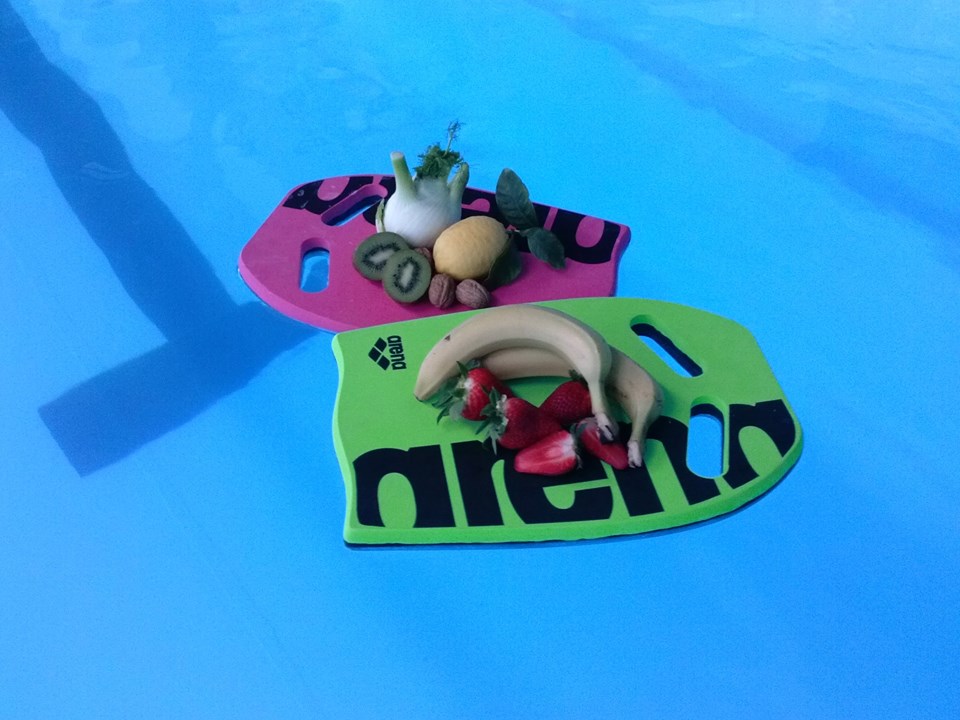Legend has it that a number of great swimmers follow ridiculous diets during the Olympics (i.e. eating 10,000 calories-a-day), eating heavy meals based around food like pasta, yoghurt, hamburgers, cereals, sausages and jam…..
Absolute nutritional madness!
Bear in mind that the daily intake of calories for an adult sportsman should never exceed 3000 calories-a-day.
Paying careful attention to nutrition has become an essential part of a sportsperson’s training plan; that is because a good diet has lots of benefits, such as improving performance, boosting concentration and preventing injury.
If you are looking for information about proper eating habits, here are some invaluable tips about healthy nutrition for sports people.
Carbohydrates for fuelling your performance
Recent studies*have shown that consuming carbohydrates with a low glycaemic index (G.I.) before prolonged exercise can have a number of positive effects, including: improving performance, reducing the amount of lactic acid produced compared to a high G.I. meal and delaying the onset of fatigue.
There are two kinds of carbohydrates: “bad” (they enter your blood system quickly and have a high glycaemic index) and “good” (they enter your blood system slowly and have a low glycaemic index or, in other words, do not excessively stimulate the production of insulin).
But let’s get straight to the point: what kind of carbohydrates are contained in various types of food? Potatoes, for example, have a much higher glycaemic index (120) than ordinary table sugar (90), while pasta (79) is assimilated much more quickly than a simple type of sugar like fructose (31). Barley, oats, almost all vegetables (except potatoes and carrots) and almost all fruit (except bananas) contain “good” carbohydrates. Bread, pasta, rice and starches are, generally speaking, “bad”.
Be careful though: you should not eliminate all foods containing bad carbohydrates from your diet. You should just eat them in moderation, because excessive amounts can, among other things, have a negative effect on your sporting performance.
Protein, fresh energy for your muscles
Proteins play a key role in a sportsperson’s diet for two basic reasons: they are a source of energy and repair damaged muscles. If you train hard but fail to consume the right amount of proteins and calories to rebuild and strengthen your muscle tissue, you can easily lapse into overtraining.
Proteins are found in all animal-based foods and their by-products, such as: turkey, fish, chicken, roast beef, egg whites (cooked), low-fat cheese and tofu.
Remember that an athlete needs more protein than a sedentary person, because, as well as burning calories due to the body’s ordinary physiological functions, they also need to train and usually have more muscle mass.
Fat or lipids, natural anti-inflammatories
Studies*have shown that a diet low in fat increases inflammation and reduces anti-inflammatory immunity. On the contrary, by increasing your intake of fat you will notice significance improvements in your performance (particularly your endurance) and in your recovery from acute inflammation.
One excellent source of fat that an athlete should never overlook is extra-virgin olive oil, both due to the amount of oleic acid it contains (an energy source that muscles can easily use) and its antioxidant properties.
I also advise you to choose foods that are rich in monounsaturated fats, such as olives, almonds and avocados and to avoid all foods containing saturated fats (egg yolks or fatty meat), trans fats or hydrogenated oils (such as industrial baked products).
In a nutshell, if you want to boost your performance:
- Try to eat meals with an average-low glycaemic index before training.
- Get used to eating well-balanced snacks throughout the day to avoid any sudden drops in your sugar levels.
- Try to eat after training/racing (this will speed up your recovery)
- Keep hydrated to prevent cramps both during and after hard exercise.
Remember that these are just suggestions. To find out more about the right diet for your own needs it is always advisable to consult a professional dietician or nutritionist.
